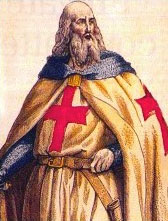Last updated on May 24, 2015
I’d like to take a break from agriculture, development, and food policy for a second to write about something more personal.
Today marks the 700-year anniversary of an important moment of history. On this day in 1314, Jacques de Molay, Grand Master of the Order of the Poor Fellow-Soldiers of Christ and of the Temple of Solomon — the Knights Templars — was burned at the stake along with three of his lieutenants on Paris’ Île de la Cité, in front of Notre-Dame Cathedral.
That event has a special significance for me. I was a teenager when I first read de Molay’s story in the first volume of Maurice Druon’s excellent series of historical novels Les Rois maudits (“The Accursed Kings“), and he has been a hero of mine ever since.
The reasons for my admiration are many. First, I would say that the most important are de Molay’s adherence to both principle and the truth — he ultimately refused to confess to the heresies the members of his Order had been falsely accused of, and he stuck to his guns until the very end.
Second, and perhaps more importantly, de Molay’s story is highly symbolic of what can happen when the power of the state — which has the monopoly of violence within its borders — goes unchecked. de Molay’s only crime had been to serve as banker to a bankrupt state, ruled by a king who did not want to face his debts and who thought it would be simpler to just jail and torture the bankers into confessing to committing fictitious crimes.
I don’t want to sound like the kind of tinfoil-hatted crank who hoards guns and canned food for the coming apocalypse, but — especially in this day and age — de Molay’s story should serve as a useful reminder that individual freedoms should never, ever be taken for granted by anyone anywhere in the world and that, as Thomas Jefferson said, the price of liberty is eternal vigilance.
Update: The Telegraph has a great article titled “A Stain on History,” about the burning of Jacques de Molay (ht: Nick Johnson.)
